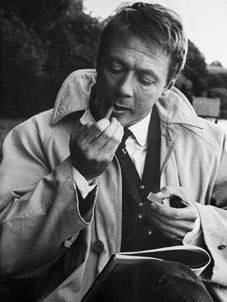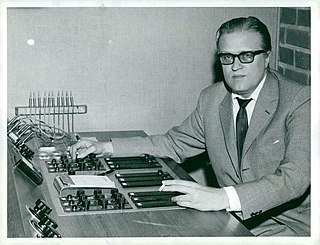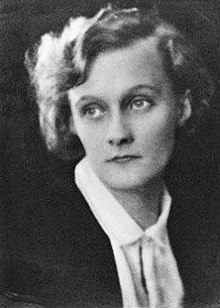
Barbro Margareta Svensson, known by her stage name Lill-Babs, was a Swedish singer, actress and television host. From the early 1950s until her death in 2018, she was one of Sweden's best-known and popular singers. She represented Sweden in the 1961 Eurovision Song Contest in Cannes with the song "April, april". She was also well known for the song "Är du kär i mej ännu Klas-Göran?".
"Nu tändas tusen juleljus" is a Christian traditional Swedish language Christmas song, written in 1898 by the Swedish song text writer Emmy Köhler. Translated into English, the title literally means "Now are lit a thousand Christmas candles". The theme of the song is the gospel of the newborn Christ and specifically its aspects of domestic harmony and inner peace, brought by the lights of candles as well as of the stars above, most importantly the star of Bethlehem. It was one of the most popular Christmas songs in Sweden during the 20th century, in churches, homes and schools. Swedish pop singer Agnetha Fältskog recorded the song on her album "Nu tändas tusen juleljus", named after the song, with her daughter Linda Ulvaeus.

Georg Riedel is a Swedish double bass player and composer. Riedel migrated to Sweden at the age of four and attended school in Stockholm, including the Adolf Fredrik's Music School.

Siw Gunnel Margareta Malmkvist is a Swedish schlager singer and actress popular in Scandinavia and West Germany. She had a number one hit in West Germany in 1964 with "Liebeskummer lohnt sich nicht", and on 18 July 1964 she became the first Swede to have a hit on the US Billboard Hot 100 chart, when "Sole Sole Sole", a duet with Italian singer Umberto Marcato, entered the chart, peaking at No. 58.

Emil of Lönneberga is a series of children's novels, written by Astrid Lindgren in 1963, 1966 and 1970 respectively, about the prankster Emil Svensson who lives on a farm in the Lönneberga parish of Småland, Sweden.

Johan Allan Edwall was a Swedish actor, director, author, composer and singer, best-known outside Sweden for the small roles he played in some of Ingmar Bergman's films, such as Fanny and Alexander (1982). He found his largest audience in the Scandinavian countries for playing lovable characters in several of the film and TV adaptations of the children's stories by Astrid Lindgren. He attended Stockholm's Royal Dramatic Training Academy from 1949 to 1952. During his long career he appeared in over 400 works. At the 10th Guldbagge Awards in 1974, he won the award for Best Actor for his role in Emil and the Piglet.

Nils Olof "Olle" Hellbom was a Swedish film director, producer, and screenwriter. He is most famous for directing films based on novels by Astrid Lindgren. His 1960 film Alla vi barn i Bullerbyn was entered into the 2nd Moscow International Film Festival. In 1978 at the 14th Guldbagge Awards he won the award for Best Director for his film The Brothers Lionheart.

Maud Hansson was a Swedish film actress. She appeared in 20 films between 1956 and 1991. Her filmography includes supporting roles in the Ingmar Bergman films The Seventh Seal and Wild Strawberries as well as her portrayal of the slightly naive maid Lina in the Emil of Lönneberga films (1971–1973) based on Astrid Lindgren's books.

Emil i Lönneberga is a 1971 Swedish film, the first of three films based on the Emil i Lönneberga books written by Astrid Lindgren.
"Sjörövar-Fabbe" is a Swedish shanty-style children's song originally written by Georg Riedel and Astrid Lindgren for the film Pippi in the South Seas in 1970. The lyrics are about Pippi Longstocking's great grandfather Fabian "Fabbe" Longstocking who was a feared pirate captain on all seven seas. The last line of the chorus "Tjoa hadelittan lej" is a nonsense phrase. The song was originally performed by Pippi Longstocking actress Inger Nilsson who published it in 1975 as B-side of the single "Här kommer Pippi Långstrump". In 2001, it was covered as a crossover version with the melody of Dio's "Holy Diver" by the Swedish metal band Black Ingvars. Other Swedish versions are by Plura Jonsson in 1999, by Siw and Tove Malmkvist in 2003 and by Johanna Grüssner and Mika Pohjola who performed a jazz version of this song in 2006. A Norwegian version with lyrics by Marit Trulsrud is by Anita Hegerland and Frank Cook from 1970. There is also a German version called "Seeräuber-Opa Fabian" with lyrics by Helmut Harun. It was first performed by actress Eva Mattes in 1970 and covered in 2012 by German singer Lena Meyer-Landrut for the compilation album Giraffenaffen.
Bert is a Swedish television series with 12 episodes, based on the Bert Diaries by Anders Jacobsson and Sören Olsson, and originally airing over SVT each Saturday evening during the period of 1 October-17 December 1994. It was directed by Tomas Alfredson and Svante Kettner. The theme song was performed by Lill-Babs, and called "Älskade ängel". Another song regaining revival with the TV series was Sven-Olof Sandberg's 1938 success "Är det så här när man är kär".
"Idas sommarvisa" or "Du ska inte tro det blir sommar" is a song with a summertime theme. Astrid Lindgren wrote the lyrics and Georg Riedel composed the music. The song's three verses were performed by Lena Wisborg in the 1973 film Emil and the Piglet.
"Det är advent" or Ett litet barn av Davids hus, is a Swedish Advent song with lyrics written by Britt G. Hallqvist in 1966 and music by Olle Widestrand. Music is often mentioned to have been published in 1981, but sources say the tune is older, and was in use already in the 1970s, as the song is published in Swedish 1977 children’s songbook Smått å Gott.
"Älskade ängel" is a song, written by Per Johan Widestrand and recorded by Lill-Babs. The single was released under the name Lill-Babs & Heman Hunters and in 1994 the song was used as signature melody for the SVT TV series Bert , where the refrain can be heard. In the TV series, Bert is seen dancing at the mirror when the song was played, while appearing words showed the episode title.
Julpolska, also known as Nu ha vi ljus här i vårt hus, is a Christmas song with lyrics by Rafael Hertzberg (1845-1896) and music by Johanna Ölander (1827-1909). Song lyrics describe Christmas Eve, dated from a time when the Christmas goat at many places still was the giftbringer, not Santa Claus.
Lilla snigel is a traditional Swedish children's song for very young children, which is very simple to sing. The song is about a snail and was published in Våra visor, part 1, 1957.
Vattenvisan is a children's song with lyrics by Lennart Hellsing and Lille Bror Söderlundh, and published in 1960 in Våra visor 3. The song was written for the school radio programme Bara vanligt vatten in 1957, and originally had seven verses. During publication, two of them were removed.
"En tuff brud i lyxförpackning" is a song written by Simon Brehm, Sven Paddock and Gösta Stevens, and originally recorded by Lill-Babs. Her version was released in August 1961 with the film Svenska Floyd.

That Boy Emil is a Swedish animated film based on the Astrid Lindgren books of Emil i Lönneberga. It was released to cinemas in Sweden on 25 December 2013.
Astrid Lindgren’s plays are a number of theater plays written by Astrid Lindgren in the 1940s to 1970s. Part of the plays are based on her books, other stories were only written for theater. Since almost all of Astrid Lindgren's works have been staged for theater, this page only deals with the plays, whose scripts were written by Astrid Lindgren. Many of these works were published in the Swedish books Sex Pjäser för barn och ungdom (1950), Serverat, Ers Majestät! (1955) and Praeser för barn och ungdom. Other Samlingen (1968). Most of these works have not been translated into English. These include stories about well-known characters such as Kalle Blomquist or Pippi Longstocking, which were only written for the theater and were not published as prose.









